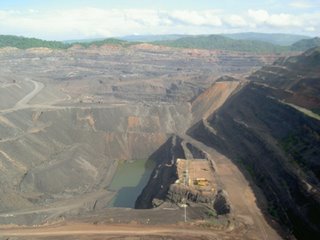Coal and Wayuu in Venezuela
Paula Palmer - 25.02.2007 18:47
“We will not be removed from the lands where our ancestors are buried. We are defending the animals, the forests and the water. This planet can’t withstand any more contamination. What good is all this wealth from oil and coal if we are dying of diseases and misery? Several years ago they pushed out some of our people to make a coal mine. In that region the animals, the fish, the birds and the people are all sick. Now they want us to move again so they can make more mines, but there is nowhere to go. We will defend our lands and our heritage with our lives.”
– Jorge Montiel, Wayuu leader, Venezuela

The Sierra de Perija is the northernmost range of the Andes Mountains, reaching to the Caribbean along the Colombia-Venezuela border. Rich in primary forests and biological diversity, the Sierra has become a battleground where the Venezuelan government must make a choice between indigenous peoples’ rights and environmental protection on one hand, and profiting from the region’s massive coal deposits on the other.
The Sierra’s quarter-million indigenous people have already experienced environmental devastation, disease, and social upheaval since two enormous open-pit coal mines began operations in 1987. Now they are uniting to stop construction of three new mines and the expansion of one existing mine within their territories. The mining projects, which would quadruple Venezuela’s coal production, would be joint ventures between the Venezuelan state and mining companies from the United States, Ireland, Brazil, Australia, Chile, Japan, and elsewhere.
For Venezuela’s Wayuu, Yukpa, Bari, and Japreria peoples, the primary issue is securing their land rights, including the right to deny access to subsurface mineral deposits. Venezuela’s new constitution requires the state to demarcate indigenous lands and award collective land titles—a significant step forward for indigenous peoples’ rights. But so far, the Chavez government has excluded existing mines and mining concessions as well as large cattle ranches from the titles it offers indigenous communities (the constitution says only that exploitation of natural resources will be carried out without harm to indigenous peoples and their lands; it does not preclude that exploitation). The indigenous people create their own maps, and then a government agency creates the title documents. That’s where the problems have arisen: The indigenous people demarcate all their territories, but when the titles are given they exclude mining concessions and cattle ranches. In some provinces the government has apparently facilitated agreements between cattle ranchers and the indigenous populations, whereby the ranches are reduced in size but not eliminated. But it seems that in the Sierra de Perija the indigenous groups do not want to make such compromises. From the indigenous point of view, the ranchers invade indigenous territories and then burn down the huts and homes of indigenous people. I met a family who were all wearing borrowed clothes because their house had been burned down the week before.
“We want title to all our ancestral lands,” says Yukpa leader Leonardo Martinez, “including the ranches that were stolen from us and the places where they found coal.”
One of the largest problems with the mine is the deforestation at the mine sites, which would cause erosion and silting of the rivers. The mining operations would contaminate rivers with heavy metals, endangering the health of fish, wildlife, birds, livestock, and humans. Acid mine drainage could continue to pollute the land and water for centuries to come. Wayuu activist Angela Gonzalez puts it succinctly: “We can live without coal. We can’t live without water.”
The three proposed new coal mines would destroy huge expanses of ancient tropical forests that provide habitat for hundreds of endangered species, including many that are found nowhere else on earth. During the last 50 years, cattle ranchers invaded the Sierra’s lower altitudes, systematically destroying forests. As a result, jaguars, ocelots, Andean bear, giant anteaters, iguanas, macaws, and spider monkeys already face extinction, and their demise would be accelerated by the coal mines.
Venezuela’s President Hugo Chavez inspires hope in his country’s poorest citizens by using oil profits to provide far-reaching education, health, and employment programs. But environmentalists and indigenous people fear that the environmental destruction caused by these extractive industries will inevitably undercut the social gains and condemn future generations to illness and poverty.
Four times in the past year, the Wayuu, Yukpa, Bari, and Japreria peoples took their protests from the forests to the streets of Caracas, marching under banners saying “No to Coal!” At the World Social Forum in January 2006, they appealed to world citizens to help them convince President Chavez to annul the coal concessions on their lands. On their behalf, Global Response, a U.S.-based network for environmental advocacy, has launched an international letter- writing campaign. Please see the Global Response action alert at www.globalresponse.org, and write a letter to support indigenous peoples’ rights and environmental protection in Venezuela’s Sierra de Perija.
Paula Palmer is executive director of Global Response. She visited Wayuu and Yukpa communities in the Sierra de Perija in January 2006 and collaborated with their leaders to develop the Global Response campaign.
 Website: http://contrapoder.org.ve Website: http://contrapoder.org.ve
|

